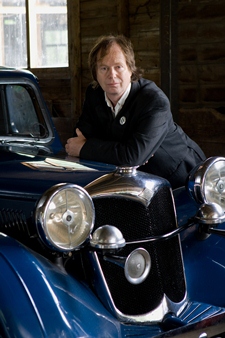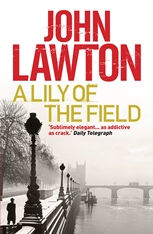 ‘Where do get your ideas?’ is probably the question most hated by writers, but I’m asking it of myself. Something sowed the seed of a novel depicting the life of a survivor of the Auschwitz Ladies’ Orchestra. A cellist. The cellist of that orchestra was Anita Lasker, who has written a memoir, but I was well into the novel before I read it. The idea did not originate there.
‘Where do get your ideas?’ is probably the question most hated by writers, but I’m asking it of myself. Something sowed the seed of a novel depicting the life of a survivor of the Auschwitz Ladies’ Orchestra. A cellist. The cellist of that orchestra was Anita Lasker, who has written a memoir, but I was well into the novel before I read it. The idea did not originate there.
So the next question was when did I, child of the immediate post-war era, first hear of the Final Solution? (Note I do not use the word ‘Holocaust’, the Israeli writer Amos Oz talked me, and for all I know many a writer, out of using that term years ago … “It wasn’t a phenomenon of nature, like a tornado or a flood.” Indeed it wasn’t it was what man did to man. In addition, I had always been baffled by Hannah Arendt’s shocked invention of the phrase ‘the banality of evil’. What was she expecting of Eichmann, tails and a horn?) Moreover, I can’t remember not knowing, and that forced me back to my father … a natural storyteller, a yarn spinner with more than a kiss of blarney to him.
His war took him to Hamburg in 1945, where he was responsible for disarming the German stockpiles of bombs – this was a man who could dismantle a hand grenade, I might add – but it was by no means his first visit. He was if anything a krautophile (don’t reach for the OED, it ain’t there), a regular visitor pre-war. I still have his last photo album. All the things that might interest a kid from a Lancashire cotton mill, beer and birds, except in the last photograph as he captured a street in Bavaria at first light, utterly deserted and lined with swastikas. He never went again as a civilian. Nevertheless, friendships persisted, His old pal Werner was unfortunate enough to be drafted into the Wehrmacht and finding himself on the Italian front in 1943 deserted and crossed the American lines into internment for the rest of the war and exile for the rest of his life. Back home in Bavaria his parents paid the price of his desertion. Dachau.
Sometime after the surrender, a letter reached my father in Hamburg. I’ve no idea how. Werner asked if he could find his parents. My father requested leave, surprisingly, got it, and set off. Hamburg is nowhere near Bavaria, so the journey was south to Dachau across the American Zone, where he found Werner’s parents alive if not actually well.
The implication of this journey did not hit me until years later. My father, who talked often about his war, had travelled the length of the allied zones to a German concentration camp in the first weeks of peace. I have no single memory of him telling me what had gone on there, but given that the man would answer any question, buy you any book you might ask for, I have to conclude that this is why I have known about the German murder machine for as long as I can remember.
Aged seventeen or so I was surprised to find that I was an oddity in this respect.
It is spring 1964 or ‘65. I have volunteered for a weekend filmmaking course at a country house in darkest Derbyshire – you may imagine what pretensions this imbued me with. After a day of shooting scripts by me that made Magical Mystery Tour look logical, we all sat down to watch what films the staff had brought for us.
La Jetée by Chris Marker. (I defy any writer to shuck off the influence of this film) and Alain Resnais’ Nuit et Bruillard – the death camps in colour. Told me nowt I did not know, but told it in colour. Some of my fellow-students wept. One turned to me and asked why she had never been told about this.
Well, one reason might be the willingness of any culture to accept and consider what had happened. Primo Levi was one of the first survivors of Auschwitz to write about it, in If This Is A Man in 1947 or ‘48. The book sold 1500 copies. Nobody wanted to know. Less than ten years later Resnais made his film – the French government tried to get it banned. Still nobody in power wanted to know … and, as Robert Littell remarked to me on panel a few years ago, nobody thought they would be believed anyway. By the 1960s that had changed and a deeply disturbing book, Treblinka by Jean-Francois Steiner, became a bestseller.
Such is the operation of memory that when I came to watch Nuit et Bruillard again whilst writing Lily I was surprised to find that it depicts, however briefly, the Ladies’ Orchestra of Auschwitz. I had stored this memory, untapped for forty years and more.
Writing about Auschwitz, and I might add my novel depicts it for less than 25 pages, is asking to be shot down in flames. One American blogger described me as delivering “Auschwitz attenuated, Los Alamos light” – I thought about this – who wouldn’t? – and then I googled all his other book reviews. He’d reviewed ten books in a fortnight and I stopped thinking about what he had said. (Can’t be arsed with skim-readers. Read seriously or watch reality TV. In the words of Brian Cox, ‘I don’t want you! Switch to ITV’!) But … better critics by far have set the shifting ground rules … Adorno’s “Nach Auschwitz ein Gedicht zu schreiben ist barbarisch.” (After Auschwitz to write, a poem is barbaric.) is often quoted, and in Adorno’s further writing often qualified. George Steiner summed up succinctly why I wanted to write this book:
“We now know that a man can read Goethe or Rilke in the evening, that he can play Bach or Schubert, and go to his day’s work at Auschwitz in the morning.”
He can. And it’s still shocking.
In 2005, there was some remembrance of the liberation of Auschwitz by the Russians in January 1945 – Primo Levi was among those so liberated. A neighbour, far younger than I, asked me “How long do we have to keep going over this?”
I was tempted to say ‘as long as there’s a single living survivor’ but it would have been the wrong answer anyway. There is no right answer. And there have been poems after Auschwitz and doubtless poems about Auschwitz – and there is as Imre Kertesz put it, just a couple of years before winning his Nobel prize, a ‘holocaust conformism, along with a holocaust sentimentalism, a holocaust canon and a system of holocaust taboos …’ As I said earlier, expect to be shot down in flames.
Another Israeli writer, Michal Gavron, herself the child of an Auschwitz survivor, gave me another reason why we will ‘keep going over this’, why writers will go on writing about Auschwitz … “How to go on living in a world that has turned into the enemy. With fear stamped into the blood … How to live within the world and outside it.”
And in that last clause I think she just gave any thinking novelist a theme for a lifetime’s work.
But here’s another reason, another theme. Promo Levi again, somewhat towards the end of his life: “Everybody is somebody’s Jew, and today the Palestinians are the Jews of the Israelis.”
Everybody is somebody’s Jew.

A Lily of the Field is published in paperback by Grove Press UK, £7.99 12th April 2012. The previous six Inspector Troy novels will be reissued throughout the year. Read Shots' review here.
flagyl 400mg
read keflex 750mg
abortion pill costs
link walk in abortion clinics
coupon for bystolic
read forest patient assistance
discount coupons for cialis
go prescription coupon card
free prescription drug discount card
site cialis savings and coupons
abortion pill pros and cons
accuton.com abortion pill stories
amoxicillin dermani haqqinda
amoxicillin amoxicillin 500 mg